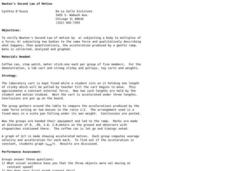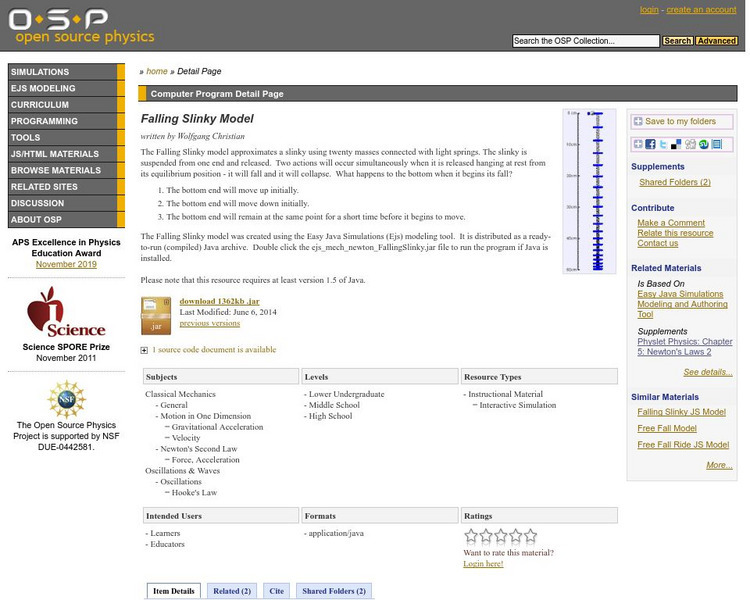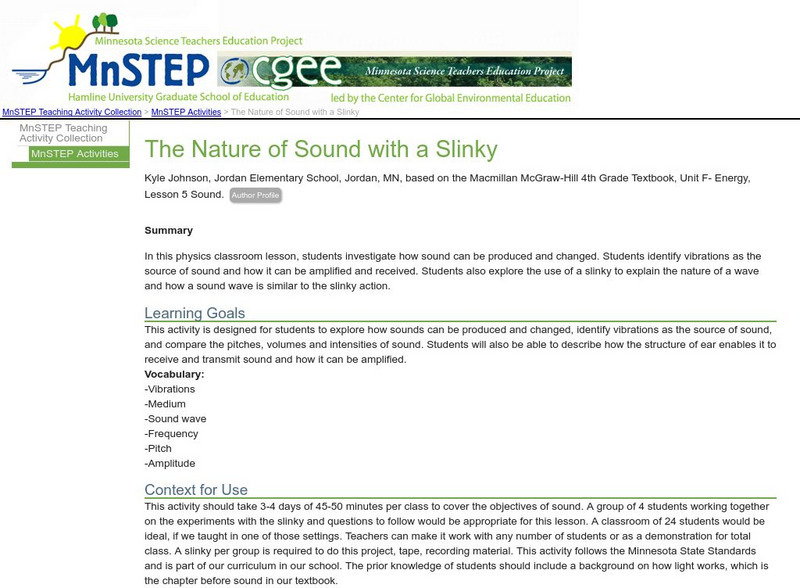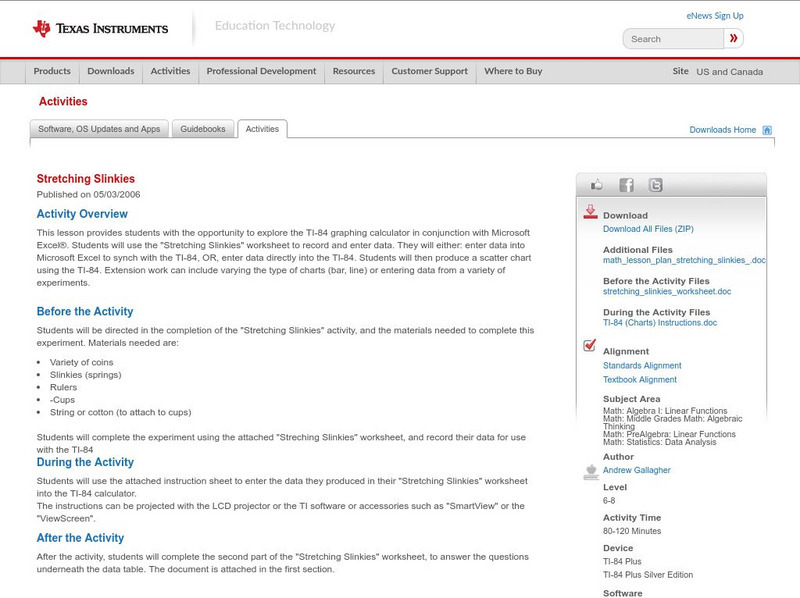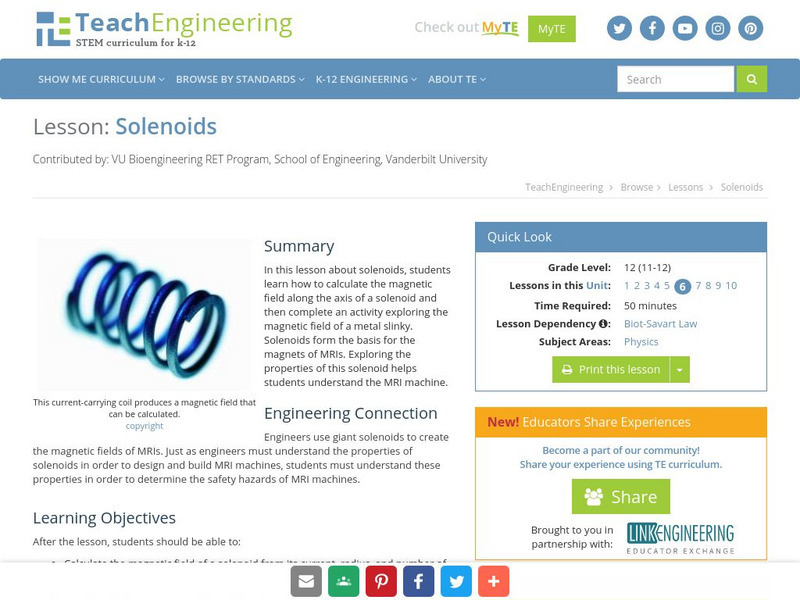Curated OER
Measuring the Speed of a Wave
Students create an experiment in which they measure the speed of a wave and record the data in a graph. They work in small groups to write the procedure for the experiment and share it with another group for cross checking of the...
Curated OER
Newton's Second Law of Motion
Sixth graders study Newton's second law of motion and verify it. In this force and motion lesson students complete a lab activity and collect data, analyze it and graph it.
Curated OER
Waves: Understanding the Motion of Waves
Students demonstrate the motion of waves. In this wave lesson, students demonstrate the various attributes to waves and the properties through a variety of hands-on activities.
Curated OER
Determining Mercantile Volume of a Pine Tree
Fourth graders, acting as foresters, determine timber volumes as sawtimber or pulpwood for marketing. They find the marketable value of a tree using its diameter and volume.
Curated OER
Wavelength and Energy
Students using a rope and other materials explore wavelengths and frequency. If time permits, more experiments can be tried.
Curated OER
Motions
Ninth graders differentiate between energy waves transmitted from a quarry or mine as opposed to energy waves transmitted by an earthquake. They analyze seismograms of blast events from at least two quarries or mines. The energy waves...
Curated OER
Music in West Africa
Learners listen to music at a designated website. They demonstrate how to make musical sounds with symbols and create their own musical composition. From activities on the website, students begin to train their ear to hear pitches and...
Science Buddies
Science Buddies: Slinking Slinkies
Want to do a project with a toy your parents, or even grandparents, might have played with? Slinkies are fun toys that also make great science fair projects. In this experiment you can build an inclined plane to compare the walking speed...
Physics Classroom
The Physics Classroom: Waves and Sound: Slinky Lab Interactive
Manipulate this virtual slinky that consists of a collection of dots to represent its coils. Grab a coil, and shake it back and forth to create vibrations which travel through the slinky from the location where it is shook to the ends...
Exploratorium
Exploratorium: The Faultline/seismic Slinky
A lesson plan for investigating longitudinal waves by use of a Slinky toy. Directions, questions, and applications to seismic waves are provided.
Exploratorium
Exploratorium: Science Snacks: Slinky in Hand
Use a Slinky toy to investigate the resonance of transverse and longitudinal waves.
American Association of Physics Teachers
Com Padre Digital Library: Open Source Physics: Falling Slinky Model
A model of a slinky consisting of a string of twenty masses connected by springs. When the slinky is released, it falls and retracts in a series of movements. The motion of the slinky can be explored by moving the masses to different...
Science Education Resource Center at Carleton College
Serc: The Nature of Sound With a Slinky
A physics lesson plan where students investigate how sound can be produced and changed. Students identify vibrations as the source of sound and how it can be amplified and received, and then explore the use of a slinky to explain the...
Texas Instruments
Texas Instruments: Stretching Slinkies
This lesson provides students with the opportunity to explore the TI-84 graphing calculator in conjunction with Microsoft Excel. Students can use the "Stretching Slinkies" worksheet to record and enter data. They will either: enter data...
TeachEngineering
Teach Engineering: Slinkies as Solenoids
In this activity, students use an old fashion children's toy, a metal slinky, to mimic and understand the magnetic field generated in an MRI machine. The metal slinky mimics the magnetic field of a solenoid, which forms the basis for the...
Texas Instruments
Texas Instruments: The Magnetic Field in a Slinky
Students use a Magnetic Field Sensor to measure the magnetic field and the current in a solenoid. They explore factors that affect the magnetic field, study how the field varies in parts of the solenoid, and determine the permeability...
A&E Television
History.com: The Surprising Origins of 7 Classic Toys
Many childhood memories include hours spent molding Play-Doh, or watching a Slinky glide down the stairs, or marveling at the transfer of a newspaper comic to a simple wad of Silly Putty. But those famous novelty toys didn't start out as...
Curated OER
Slinky and Hand
The different types of earthquake waves are discussed and illustrated with. Features geologist video clip.
PBS
Pbs Teachers: Scientific American: It's a Kid's World: Body Sense
Investigate potential and kinetic energy by investigating the elasticity of a metal coil toy, the Slinky. Explore the development of muscle coordination in children and measure how practice improves performance of motor skills.
TeachEngineering
Teach Engineering: Solenoids
This lesson discusses solenoids. Students learn how to calculate the magnetic field along the axis of a solenoid and complete an activity exploring the magnetic field of a metal slinky. Solenoids form the basis for the magnet of an MRI....
Curated OER
Slinky2
A lesson plan for investigating longitudinal waves by use of a Slinky toy. Directions, questions, and applications to seismic waves are provided.
Curated OER
Slinky3
A lesson plan for investigating longitudinal waves by use of a Slinky toy. Directions, questions, and applications to seismic waves are provided.
Curated OER
Circular Motion
A lesson plan for investigating longitudinal waves by use of a Slinky toy. Directions, questions, and applications to seismic waves are provided.
Other popular searches
- Slinky Wave Lab
- Seismic Waves Slinky
- Transverse Waves Slinky
- Wave Lab Using Slinky
- Slinky Lab
- Sound Waves Slinky
- Slinky Sound Demonstration
- Slinky Wave
- Slinky and Waves

